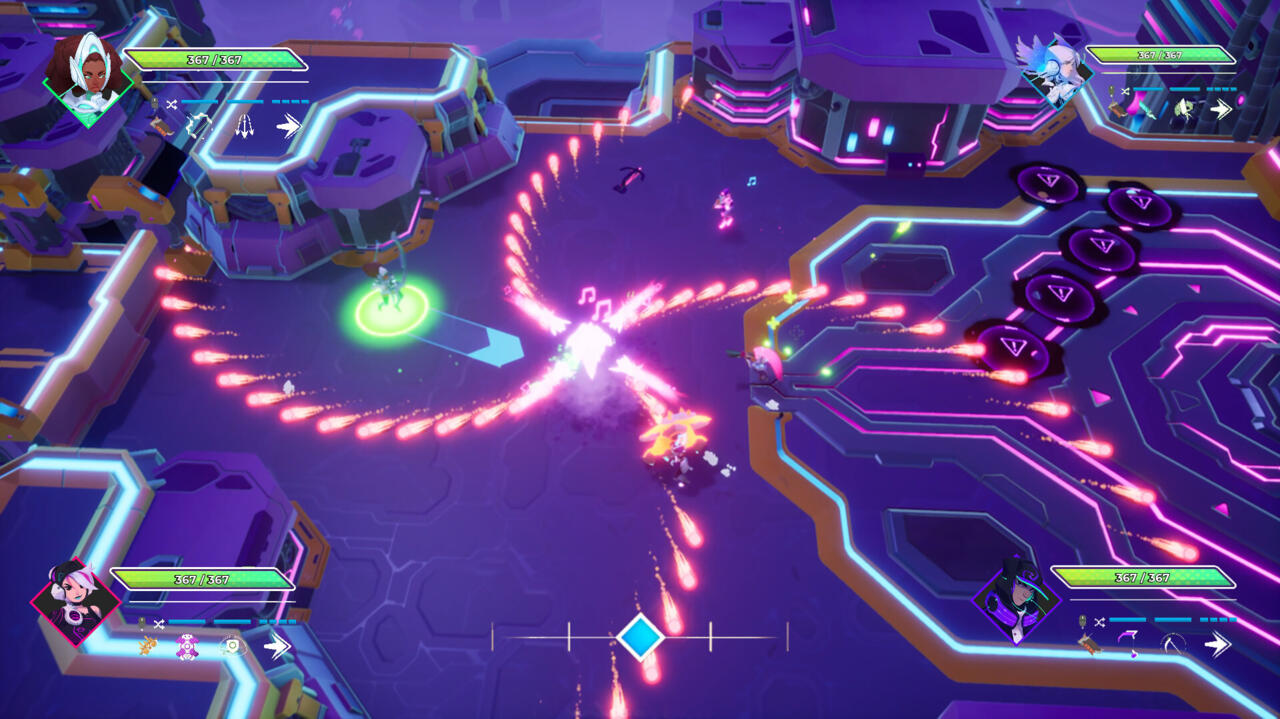It’s easy to fall in love with the idea of Soundfall. Its action role-playing gameplay marries concepts from twin-stick shooters and rhythm games, challenging you to stick with the beat as you attack enemies while dodging their blows. It’s a conceit that has been experimented with in multiple other games, sometimes to great effect. But those other successes manage to enhance the mechanic beyond its initial charm, which isn’t something Soundfall ever quite replicates in its extensive campaign.
Everything in Soundfall moves to the beat of the song playing in the background. All your actions require you to time them according to the beat to be effective, whether that’s your standard ranged attacks, up-close melee swipes, or damage-dodging dashes. Enemies are similarly tied to the same constraints. Their attack patterns don’t change with the beat, but the speed of them does. The build-up time associated with the shot of a sniper will be faster or slower based on the song playing, for example, while the speed of environmental hazards is similarly affected.
Playing in tune with Soundfall’s music initially feels exhilarating. It doesn’t take long to match up to the new rhythm presented by a new song, but it still feels satisfying to settle in and fire off hundreds of perfectly timed attacks and execute precise dodges. Enemy variety is sparse at first, but there’s a decent number of combinations that keep most skirmishes engaging enough, and certainly challenging enough to encourage you to keep hitting well-timed attacks to do the most damage you can. It’s enough of a hook that it makes the otherwise routine isometric action fun, but also what quickly becomes monotomous as Soundfall fails to do anything new with it beyond the initial rush.
Probably the biggest issue with Soundfall’s progression is that it doesn’t feel like it’s progressing at all. The way you approach the game’s combat in the first hour is the same as you will in its tenth–follow the beat, kill enemies, grab loot. There’s little in the variations of weapons to shake this up, with different types simply dictating whether you’ll need to attack on each beat for semi-automatic weapons or regain your rhythm after a flurry of automatic shots. The five unlockable characters do offer some variety in their special attacks, many of which are all variations of different types of satisfying melee swipes, but it’s not enough to detract from the fact that your objective, and how you achieve it, is so rigid.
Loot is similarly underwhelming for a game that requires you to change up your equipment so regularly. The variety of weapons soon start introducing various musically themed status effects to your attacks, but enemies rarely provide the sort of challenge where you’re required to really think about what you’re taking into the next stage. For the most part I got by simply by ensuring I had a weapon that did the most damage it could, with armor that soaked as much damage as it could, and found that was all the thinking required. Loot also doesn’t change the way your selected character looks outside of the weapon they have equipped, so there’s no vanity reason to hunt down a piece of extremely rare loot either. Although finishing stages with higher ratings or at higher difficulties rewards you with better loot, it’s difficult to care beyond pride when the pickings on offer are nowhere near enticing.
Soundfall’s large library of music is logically meant to offset its shortcomings with its loot-driven progression, providing a variety of different music types and signatures to keep gameplay dynamic. While there are instances of this working, like sparse moments where timing signatures change mid-way through a level, you’re mostly only learning a beat in the first few seconds of a level and then continuing with the same routine. Each of the game’s 10 worlds also tries to stick to a certain genre of music, which only makes this issue more prevalent. Working your way through several stages of speed metal exposes how little variation Soundfall’s mechanics demand from you when changing from 140 bpm to 160 bpm, with the subtle difference not significant enough to evoke a shift in your approach. Even when moving from an incredibly fast song to one that’s immediately slower, the change doesn’t do enough to remove the feeling of repetitiveness from the proceedings.
Some of Soundfall’s music, which features a mix of both original and licensed tracks, also feels ill-suited to a game of this ilk. Where Soundfall hits a stride is with songs that have a distinctive bass beat that punches through the mix, letting your ears inform your hands with respect to your actions. This isn’t the case for many songs, however. Classical songs are notoriously bad at this, at least in the context with how they’re mixed in Soundfall. I was routinely checking the visual metronome on the bottom of the screen to even understand what beat Soundfall had interpreted for a handful of these tracks, given the lack of any discernible one in the music alone. This interrupts the gameplay severely, immediately making you miss actions routinely or dragging your vision away from the action to regain your momentum. It’s mostly frustrating because it’s easy to tell the difference between these good and bad songs as soon as a stage starts, making the already overly lengthy campaign one that’s fraught with several, annoying speed bumps.
Exacerbating the annoyances with the campaign is the limited selection of pieces that the game’s procedural generation seems to be able to pick from when forming a level. Although each of the songs in each level is unique, the structure is anything but. It takes just a handful of hours for the same chokepoints and slightly open parts of a stage to all look familiar, despite the different aesthetics they’re dressed up in to accompany the theme of the world you’re currently in. While the visual variety between a vibrantly green forest world and that of a neon-shocked audio highway provide, the mundane nature of how you navigate through them always manages to bubble to the surface.
Gluing each of these worlds together is a thread-bare story about several real-world musicians being inexplicably teleported to a land that lives and breathes on music. All the text-based dialogue is riddled with every music-based pun you can possibly think of, which is so overbearing that it ends up coming off as annoying more than charming. Aside from providing context for the game’s action, however, the story is nothing more than something you have to occasionally check in with as you click through menus to start the next level. The mixture of the Saturday morning cartoon cutscenes is also at odds with the style of the character portraits in-game which, while not distracting, just seem out of place.

Despite all of these shortcomings, Soundfall does manage to produce some memorable moments from time to time, mostly at the culmination of each world. Despite the absence of what feels like the right place for a traditional boss battle, most final stages are challenging combat trials where far more enemies than normal are thrown at you in a small arena. This turns Soundfall briefly into a rather satisfying bullet hell shooter, where firing off shots is as important as dodging the hundreds of projectiles hurtling towards you. These short skirmishes make the best parts of all of Soundfall’s ideas harmonize, but also serve to highlight how routine all the previous nine stages felt up until that point. The few boss fights also don’t reach the highs of these small arena duels, so I was just left wanting more of them most of the time.
It’s these moments of bliss that make Soundfall ultimately so disappointing, because it’s clear that there are good ideas here. The combination rhythm-based action is one that has been executed better in a handful of other games already, and Soundfall’s take doesn’t manage to progress beyond its initial hook in its opening hours. This exposes the uninteresting loot progression and stage variety even more, making its extended campaign feel far, far too long, even when tackled in short bursts. Soundfall’s underlying concept is one that feels deserving of an adventure that capitalizes on its strengths better, but that’s sadly not what’s here right now.






